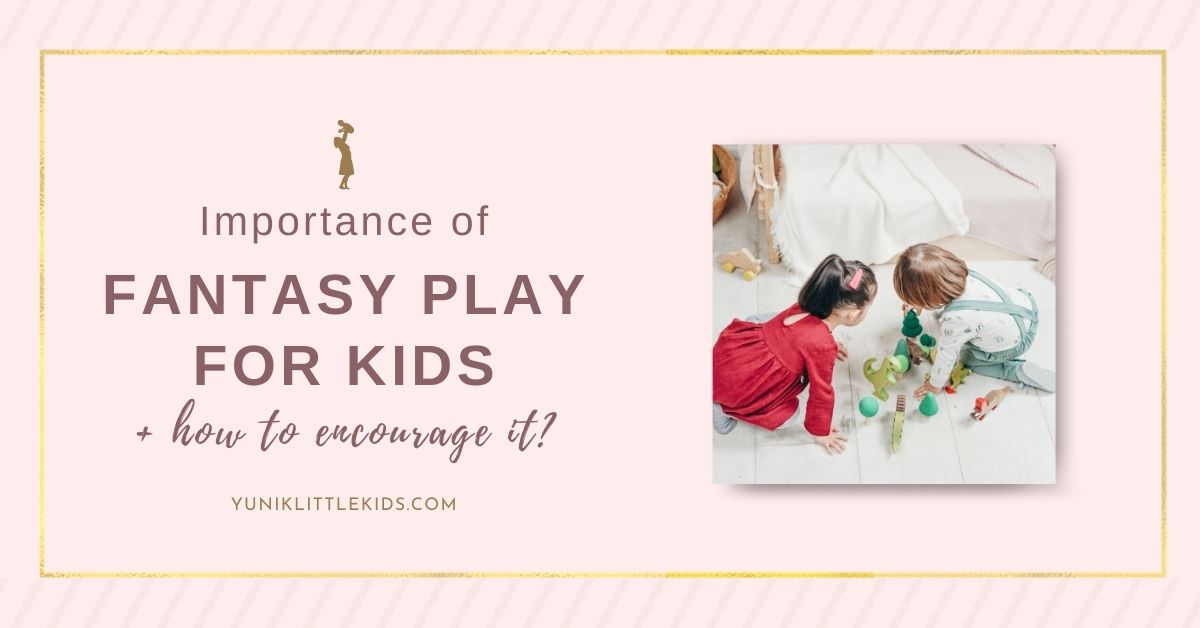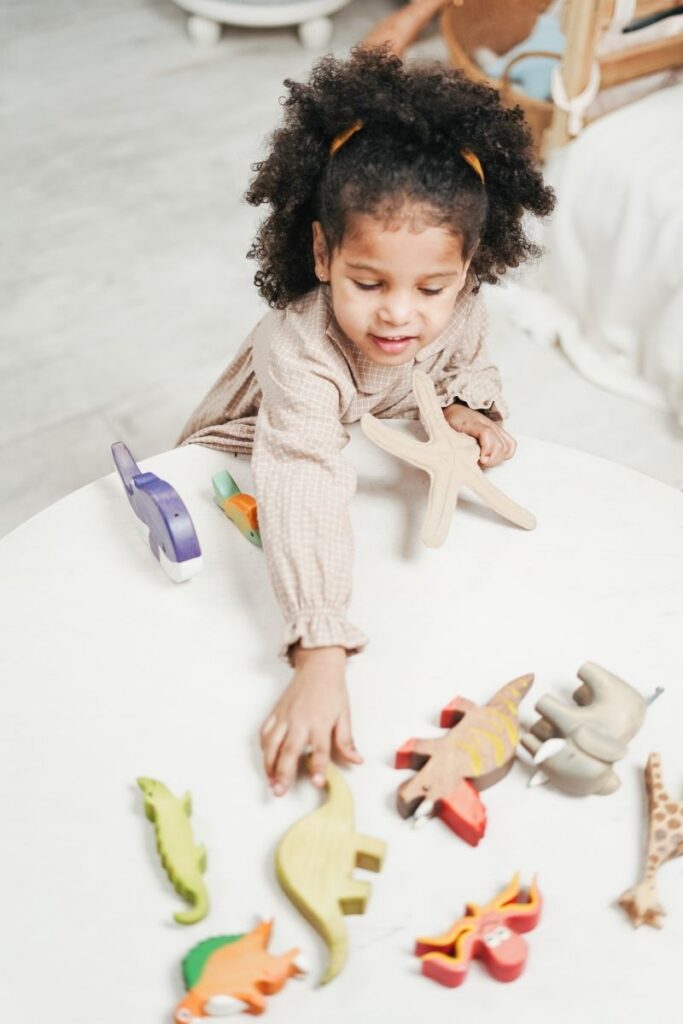
Importance of fantasy play for children – What It Is and How To Encourage It
It’s no secret that playtime is an important part of childhood. It’s a time for kids to explore various interests and develop their imaginations, while also learning life skills they can use later in adulthood.
But are you aware that the type of play children engage in matters too?
Various creative play especially fantasy play or pretend play is often discouraged most times. Though so many studies have shown the importance of play, people still have their own doubts about games like dress-up games and make-believe.
While it’s important to have a balance between creative activity and more structured learning time too, encouraging fantasy play is an important part in helping children develop skills that will last throughout their lives.
In this blog post, we will discuss what fantasy play is and why it has become so popular among parents and educators alike.
What is fantasy play?
So what exactly is fantasy play?
Fantasy play is when children engage in activities that have no direct real-world application, such as playing with dolls or toy cars.
Activities such as dressing up like a princess or pretending to be a superhero.
It can also be something like make-believe pretend play activities.
The child’s imagination is limitless and their creativity knows no bounds. When they are engaged in a pretend play, the sky becomes the limit for how creative these children can be as they turn even a simple sand tray into an excavating site or transform it to become anything from a restaurant table seatings to a fairy land with small trees.

The Importance of Fantasy Play For Children – Pretend Play For Toddler Benefits!
A fantasy play or a pretend play has many more benefits to the children than just keeping them engaged for quite some time. The benefits of these types of activities are not only limited to the child but also to the adults involved.
Imagination is limitless.
Creativity knows no bounds, it simply depends on how creative they want to be and what’s within their vicinity that can be used as props or backdrops.
Reduces screen time
In the modern world, we are constantly faced with what can seem like an endless number of screens, from televisions to computers, and smartphones. Children are being exposed to screens at younger ages than ever before and often do not have a choice in the matter.
With some fun pretend play activities with toys or other kids, they are able to take a break from the screens and engage in these creative activities.
They get hooked up in the world they create and forget where they are, what time it is or who they are with.
This can be a way to reduce screen time and encourage more physical playtime in an increasingly digital world.
Helps to relieve anxiety and fear

We are in a world of so much stimulation that actually keeps children’s brains so active and fussy. This has created so many problems like anxiety issues in children. Kids tend to be angry, clingy, or irritable so soon, have trouble sleeping, and even have some physical issues like fatigue, headaches, etc…
Though worries & fears are common parts of childhood, when it become so much embedded in daily activities, they can become trouble to the children as well as the people around them.
Fantasy play is actually the perfect remedy to these issues. It releases the stress and anxiety in kids as well as helps them get more imaginative, and creative and explore their imaginations.
They feel like they are the boss of their own world. By simply acting out a story and adding their own creative elements to it, they take charge of the plot. This makes them more confident eventually making them happy and relieving stress.
Makes sense of the world
Fantasy play is the first chance for children to understand about themselves, their likes, dislikes & more importantly, about the world. Dramatic play experiences help children experiment with their understanding of their surroundings.
They get to use their imagination & take the chance to explore various ways of what life might be like. They make sense of all the things happening around them by using some pretend scenarios that may not seem possible in real life.
So, pretend playtime gives a whole new perspective for them which helps develop a good understanding of the real world eventually.
When they witness a certain scenario at a hotel like a waiter telling about the menu and taking the order, they may replicate the scene at home. This way they get to understand better, create a make-believe experience for themselves, and feed their brain what actually happens in a hotel in the real world.
Practice as an adult
When kids are involved in a fantasy play, as said above they take charge of the happenings. This helps them learn how to make decisions, understand the consequences of their actions, and make good choices.
Precisely, they take the role of an adult. You can see this in their expressions, how they handle and even dress up as an adult for instance.
While in the real world, they may never get a chance to encounter situations that an adult would. But in their fantasy play, they imagine such situations and behave like an adult.
To be more clear, no children will be allowed or encouraged to light a stove and make tea. But, pretend play with a toy kitchen set replicates the process for kids. They feel like an adult and make pretend tea for you. No matter how silly it seems for us, adults, the kids will actually think they are doing an adult job and practice being an adult.
Builds confidence
The other benefit of fantasy play is that it builds confidence in children. It helps them understand and explore what’s not allowed or appropriate to say or do in real life. In a way, it prepares kids for the world out there where things happen that we don’t want but can’t control.
When a child exhibits inappropriate behavior during a fantasy play, an adult in the vicinity will react to it. This instills a clear picture in the child’s mind of what’s right and what’s not in the given situation.
This small experience can actually build confidence in children to face the real world out there.
Skills developed through pretend play for preschoolers
To be more specific about the benefits of pretend play in children’s development, here is the impact of fantasy or imaginative play in developing various skills in them.
Emotional skills
When a child is making believe that he/she is a doctor and the other child playing with him has been injured, it can help them understand their feelings better. Engaging in such pretend play will also make them feel empowered by what they are capable of doing.
If you see children pretending to be superheroes as they save people from getting hurt or captured by villains then it is a sign that they can distinguish between the good and the bad, they get to understand empathy know who is hurt, and that they need to be relieved of the hurt somehow.
They learn to put themselves in other person’s shoes and analyze situations from their perspective.
This also helps them to become more confident about what they are capable of doing, which is a great thing especially when it comes to their self-esteem as well as how others view them. Improving these skills will mean that children will be able to have healthy relationships with other people in the future.
Self-emotional intelligence is also one of the benefits that children will experience. They will have a better sense of understanding their own emotions as well as how to react in different situations or circumstances.
This can help them become more compassionate and empathetic which are two qualities that they would need for when they grow up.
Social skills

During a dramatic pretend play, kids are actually experimenting with various roles of their personality, which will help them figure out who they are and how to behave among others.
This is one of the reasons why make-believe games can be just as important for kids as dress-up or even playing house.
As children get older, these activities also teach them about social cues like facial expressions and gestures that they may not have known otherwise.
When playing a fantasy game with other children, they understand the importance of sharing responsibility, taking turns, giving space to the other person, and so on. They learn the art of compromise while playing together for a common goal.
This gives them hands-on experience on how to socialize with people in the real world.
Cognitive skills
Cognitive skill is the term used to describe various other specific skills that the brain exhibits, including thinking, learning, reading, speaking, remembering, concentrating, reasoning, problem-solving & much more.
In the context of pretend play, almost all of these skills are aided in a fun way. Of these, the most important skills impacted by a fantasy pal are x
Language skills
Ever witnessed your child involved in pretend play? You would have probably heard them speak words or phrases that you have never imagined they knew.
They may use your own words that you have used a very long time ago.
They understand the power of words and explore the usage of language in a creative way. Their linguistic knowledge grows and their vocabulary expands.
They also understand how language functions in conversations, recognizing symbols meaning different things in different contexts.
Thinking skills
Fantasy play enables children to freely think the way they like. They can consider different possibilities and situations in their own minds without feeling pressured by reality or other people’s opinions. The endless creativity that is unleashed during these games helps them broaden their perspectives, and explore new ideas while also developing critical thinking skills.
Fantasy games also require children to use critical thinking skills such as remembering rules or following directions, distinguishing between fantasy and reality
Psychomotor Skills
Fantasy play is also beneficial for the development of psychomotor skills. Role-playing games require children to use their bodies in a variety of ways such as acting, imitating different people and animals, or using props. This helps them improve dexterity, spatial awareness, and other motor abilities at an early age which can lead to better control later on.
Problem-solving skills
A pretend play can give your child situations where they may need to solve a problem. This gives them the opportunity to experience solving a problem and could help them better understand the world.
They get to know how to make a good choice in a given situation. Most importantly, they learn to understand and decode a problem on their own.
It helps them to depict what is happening and what they can do about it.
Decision-making skills
Similar to problem-solving skills, a child can learn how to make decisions in pretend play. They have a choice of what they want, who they want, and where they are going.
They need to figure out if this is the best option or not. This may be difficult for them at first but it helps teach them about consequences too which will help when making decisions later on in life.

Role of parents in encouraging fantasy play in children
It is important for parents to encourage and enjoy fantasy play with their children. This will help make the time more fun for them which could lead to more of it happening, or at least a better quality when they do engage in these activities.
Here are a few ways how parents can help kids engage in pretend play activities.
Create opportunities
Parents should think about what they can do to create opportunities for their children to engage in fantasy play. This could be as simple as playing dress-up, reading books, or telling stories together at bedtime. They should also try and incorporate pretend activities into the family life whenever possible such as when cooking dinner or working on a craft project together.
Equip them with props
Children can benefit greatly by having props they can use to engage in pretend play. Parents should keep a variety of items on hand that could be used for this purpose, such as dress-up clothes and accessories, stuffed animals, or small toys. They also need to make sure the space is safe for exploration so kids don’t accidentally injure themselves while
Low lying shelves
Try having kids’ items on low-lying shelves which is easily accessible for kids. This creates independence in children. They can take whatever they want on their own without depending on an adult.
Make the space safe
The space should be safe for children so they don’t injure themselves while playing. You can secure sharp corners of tables with some kid safety accessories, close open low-lying plug points, and so on.
To sum it up…
Children learn from everything in their daily life. Fantasy or pretend play is one way to enhance their experience by presenting them with situations that they may face in real life only in the future. More than just preparing them for the future, it gives them a sense of connection to the adult world.
As a parent, it is our role to encourage our children to play and explore their imagination. They will have more fun and grow in a healthy way that is beneficial for them now and in the future.

